形容词比较级最高级(整理版)
完整版)比较级最高级变化规则总结
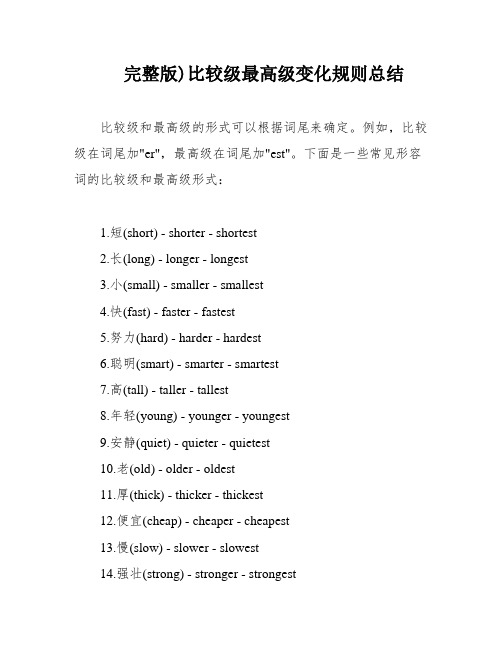
完整版)比较级最高级变化规则总结比较级和最高级的形式可以根据词尾来确定。
例如,比较级在词尾加"er",最高级在词尾加"est"。
下面是一些常见形容词的比较级和最高级形式:1.短(short) - shorter - shortest2.长(long) - longer - longest3.小(small) - smaller - smallest4.快(fast) - faster - fastest5.努力(hard) - harder - hardest6.聪明(smart) - smarter - smartest7.高(tall) - taller - tallest8.年轻(young) - younger - youngest9.安静(quiet) - quieter - quietest10.老(old) - older - oldest11.厚(thick) - thicker - thickest12.便宜(cheap) - cheaper - cheapest13.慢(slow) - slower - slowest14.强壮(strong) - stronger - strongest15.弱(weak) - weaker - weakest16.新(new) - newer - newest17.温暖(warm) - warmer - warmest18.冷(cold) - colder - coldest19.凉爽(cool) - cooler - coolest20.害羞(shy) - shyer - XXX21.紧(tight) - tighter - tightest22.干净(clean) - cleaner - cleanest23.聪明(clever) - cleverer - cleverest对于以不发音"e"结尾的单音节词,比较级直接加"r",最高级直接加"st"。
英语形容词的比较级和最高级整理

英语形容词的比较级和最高级整理常规:1、一般直接在词尾加er;est.tall---taller---the tallestgreat---greater---the greatest2、以字母e结尾的直接加r;stnice---nicer---the nicestfine---finer---the finest3、以辅音字母加y结尾的形容词变y为i再加er;estbusy---busier---the busiestheavy---heavier---the heaviest4、重读闭音节结尾的单音节词,若词尾只有一个辅音字母时,须双写这个辅音字母再加er;estbig-bigger-the biggesthot -hotter-the hottest5、少数以-y,-er,-ow,-ble结尾的双音节词,末尾加-er^D-est(以-y 结尾的词,如-y前是辅音字母,则变y为i,再加-er和-est;以-e 结尾的词仍只加-r和-st)happy—happier—happiestclever—cleverer—cleverest5、多音节和部分双音节词在词前加more、mosteasily--more easily--most easilybeautiful--more beautiful--the most beautiful特殊:(1 )有些单音节词的比较等级常用more和most,如glad,fond,shy,sly(但like 只可用more 和most)。
Eg:I am not more glad than you.我可没像你那样高兴。
Uncle Jack was more like a book of reference to my father.杰克大叔对我父亲来说真是一部参考书。
(2)有些单音节词用-er和-est或more和most皆可,如free,clear 等。
Eg:I'm clearer/more clear about it than before.对这事,我比以前更清楚了。
形容词的比较级和最高级

形容词的比较级和最高级英语中的形容词通常用三种形式来表达事物的等级差别,分别是原级、比较级和最高级。
大部分形容词的比较级和最高级是通过变化词尾来实现的,属于规则变化,但也有少数是不规则变化。
英语中有些形容词说明形状、材质等,还有形容词没有程度可分或其本身就表示某种程度,故而没有比较级和最高级。
常见的有:right 正确的 wrong 错误的 excellent 最好的 final 最后的last 最后的 possible 可能的 first 第一的 east 东方的empty 空的 wooden 木制的 impossible 不可能的 favourite 最喜欢的round 圆的 golden 金色的 square 方的一、比较级和最高级的构成1.规则变化(1)单音节和少数双音节形容词变化规则如下:1)单音节词末尾加-er(比较级),-est(最高级)【例】原级比较级最高级great greater greatestsmall smaller smallestclean cleaner cleanest2)单音节如以e结尾,只加-r(比较级),-st(最高级)【例】fine finer finestnice nicer nicestwide wider widest3)以一个辅音字母结尾的重读闭音节单音节词,须先双写这个辅音字母,再加-er(比较级),-est(最高级)【例】big bigger biggesthot hotter hottestfat fatter fattest4)以“辅音字母+y”结尾的双音节词,将y变为i,加-er(比较级),-est(最高级)【例】happy happier happiesteasy easier easiestheavy heavier heaviestfunny funnier funniest5)以-er,ow,-ble结尾的双音节词,末尾加-er(比较级),-est(最高级)【例】clever cleverer cleverestnarrow narrower narrowestable abler ablest(2)其他双音节词和多音节词在词前加more(比较级),most(最高级)【例】tired more tired most tiredinteresting more interesting most interestingdifficult more difficult most difficult(注意:A:有词根加ly构成的形容词,在词前加more(比较级),most(最高级)如friendly----friend+ly构成, friendly more friendly most friendly;B:以形容前缀un构成的三音节形容词不适合上述情况,如unhappy----unhappier----unhappiest,untidy----untidier----untidiest )2.不规则变化二、比较级的用法(1)高于或低于另一方的比较运用“比较级+than”的结构可以表达一方超过或低于另一方的情况。
期末英语必考!形容词的比较级和最高级知识点汇总

期末英语必考!形容词的比较级和最高级知识点汇总变化规则大多数形容词和副词有比较级和最高级的变化,即原级、比较级和最高级,用来表示事物的等级差别。
原级即形容词的原形,比较级和最高级有规则变化和不规则变化两种。
(1)单音节词加词尾-er,-est来构成比较级和最高级。
tall(高的) taller tallestgreat(巨大的) greater greatest(2)以不发音的e结尾的单音节词只加-r,-stnice(好的) nicer nicestlarge(大的) larger largestable(有能力的) abler ablest(3)以一个辅音字母结尾的闭音节单音节词,双写结尾的辅音字母,再加-er,-estbig(大的) bigger biggesthot热的) hotter hottestred红色的 redder reddest(4)'以辅音字母+y'结尾的双音节词,改y为i,再加-er,-esteasy(容易的) easier easiestbusy(忙的) busier busiest(5)以ly结尾的副词,除early-earlier-earliest,其他都是加more most.Slowly-more slowly-most slowlyBravely-more bravely-most bravelyquickly-more quickly-most quickly(6)少数以-er,-ow结尾的双音节词未尾加-er,-estclever(聪明的) cleverer cleverestnarrow(窄的) narrower narrowest(7)其他双音节词和多音节词在前面加more,most来构成比较级和最高级。
如:important(重要的) more important most importanteasily(容易地) more easily most easily(8)一些词的比较级和最高级,可以加-er或 -est,也可以加more 或most如:clever, polite等。
形容词的比较级和最高级

形容词的比较级和最高级一、比较级的定义:大多数的形容词都有三个级别:原级、比较级、最高级。
其中比较级表示“更……”,用于两者之间的比较,用来说明“前者比后者更……”,比较级前面一般用much, even, a little修饰,其中even, much 只能修饰比较级。
二、比较级的构成:(1)规则变化:①单音节和部分双音节的形容词一般在词尾加-erEg: calm---calmer tall---taller smart---smarter②以字母e结尾的直接在词尾加-rEg: nice---nicer fine---finer large---larger③以“辅音+y 结尾的词,变y为i,再加-er”Eg: early---earlier happy---happier busy---busier④以重读闭音节的单个辅音字母结尾的词,双写辅音字母,再加-erEg: big---bigger thin---thinner hot---hotter⑤多音节或部分双音节的形容词在原级前面加moreEg: popular---more popular important---more important(2)不规则变化:少数形容词的比较级变化是不规则的:good---better bad/ill---worse many/much---more little---less far---farther/further old---older/elder三、比较级的用法:(一)当两个人或事物(A和B)进行比较时,我们需要用到形容词(副词)的原级或者比较级1.表达“A和B一样”,用as…as的结构。
公式: A+be动词+as+形容词原级+as…+BA+实义动词+as+副词原级+as…+BEg I am as tall as you.我和你一样高。
He runs as fast as I. 他跑得和我一样快。
常见形容词比较级最高级变化一览表
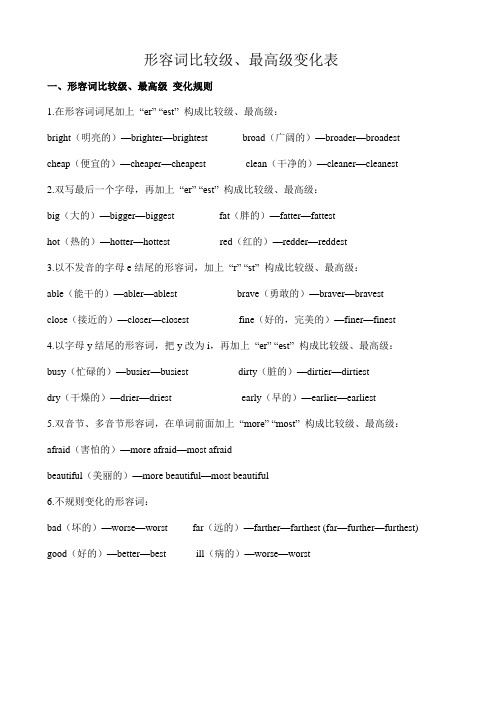
形容词比较级、最高级变化表一、形容词比较级、最高级变化规则1.在形容词词尾加上“er” “est” 构成比较级、最高级:bright(明亮的)—brighter—brightest broad(广阔的)—broader—broadest cheap(便宜的)—cheaper—cheapest clean(干净的)—cleaner—cleanest2.双写最后一个字母,再加上“er” “est” 构成比较级、最高级:big(大的)—bigger—biggest fat(胖的)—fatter—fattesthot(热的)—hotter—hottest red(红的)—redder—reddest3.以不发音的字母e结尾的形容词,加上“r” “st” 构成比较级、最高级:able(能干的)—abler—ablest brave(勇敢的)—braver—bravestclose(接近的)—closer—closest fine(好的,完美的)—finer—finest4.以字母y结尾的形容词,把y改为i,再加上“er” “est” 构成比较级、最高级:busy(忙碌的)—busier—busiest dirty(脏的)—dirtier—dirtiestdry(干燥的)—drier—driest early(早的)—earlier—earliest5.双音节、多音节形容词,在单词前面加上“more” “most” 构成比较级、最高级:afraid(害怕的)—more afraid—most afraidbeautiful(美丽的)—more beautiful—most beautiful6.不规则变化的形容词:bad(坏的)—worse—worst far(远的)—farther—farthest (far—further—furthest) good(好的)—better—best ill(病的)—worse—worst二、形容词比较级和最高级句型(特殊)比较级句型:1.在形容词比较级前还可以用much, even, still, a little,……来修饰,表示“……的多”,“甚至……”,“更……”,“……一些”。
(完整版)形容词比较级和最高级讲解及练习(附答案)
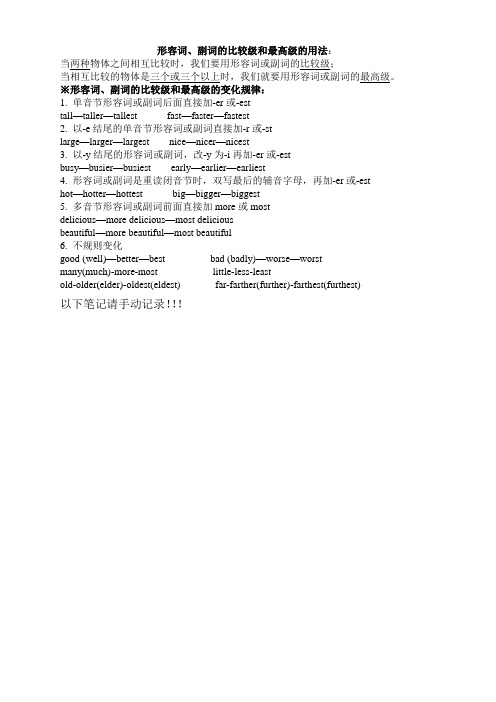
形容词、副词的比较级和最高级的用法:当两种物体之间相互比较时,我们要用形容词或副词的比较级;当相互比较的物体是三个或三个以上时,我们就要用形容词或副词的最高级。
※形容词、副词的比较级和最高级的变化规律:1. 单音节形容词或副词后面直接加-er或-esttall—taller—tallest fast—faster—fastest2. 以-e结尾的单音节形容词或副词直接加-r或-stlarge—larger—largest nice—nicer—nicest3. 以-y结尾的形容词或副词,改-y为-i再加-er或-est busy—busier—busiest early—earlier—earliest4. 形容词或副词是重读闭音节时,双写最后的辅音字母,再加-er或-est hot—hotter—hottest big—bigger—biggest5. 多音节形容词或副词前面直接加more或mostdelicious—more delicious—most deliciousbeautiful—more beautiful—most beautiful6. 不规则变化good (well)—better—best bad (badly)—worse—worstmany(much)-more-most little-less-leastold-older(elder)-oldest(eldest) far-farther(further)-farthest(furthest)以下笔记请手动记录!!!形容词比较级练习题(一)写出下列形容词与副词的比较级与最高级形式:long_____ ______ wide ______ _______ fat ____ _____heavy____ ______ slow ______ _______ few____ _____brightly______ -_____ badly _____ _______ far____ _____quickly _____ ______ happy_____ -______ unhappy________(二)用所给词的正确形式填空:1. Of the two girls, I find Lucy the _______ (clever).2. Gold(黄金) is ______ (little) useful than iron(铁).3. My sister is two years _______ (old ) than I.4. John’s parents have four daughters, and she is the _____ (young) child.5. The _____ (cheap) bags are the not usually the best ones.6. The short one is by far _______ expensive of the five.7. The boy is not so ______ (interesting) as his brother.8. Dick sings _____ (well), she sings ______(well) than John, but Marysings______(well) in her class.9. She will be much ______ (happy) in her mew house.10. This dress is ______ than that one.(expensive)(三)翻译句子:1.本书跟那本书一样有趣。
形容词比较级与最高级
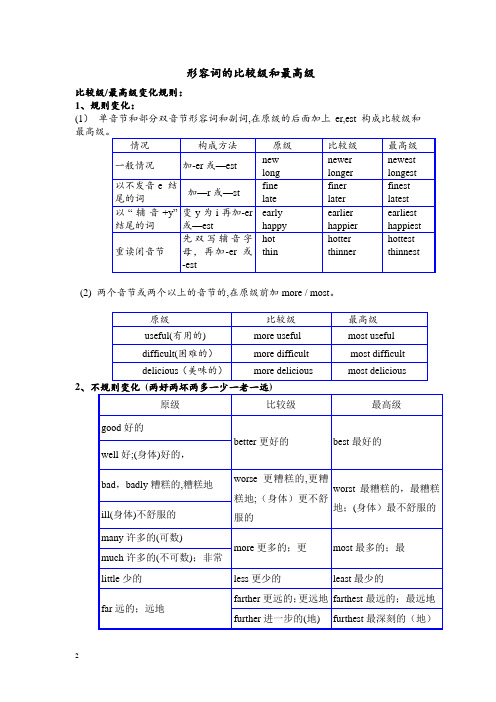
形容词的比较级和最高级比较级/最高级变化规则:1、规则变化:(1)单音节和部分双音节形容词和副词,在原级的后面加上er,est构成比较级和(2) 两个音节或两个以上的音节的,在原级前加more / most。
2(1)形容词older/elder和oldest/eldest的用法区别:区别:elder与eldest主要用于表明长幼关系,通常用于人,只做定语不做表语,也不与than连用。
This is my eldest son. 这是我的大儿子。
His elder brother works in a clothing factory. 他哥哥在一家服装厂工作。
(2)形容词farther/further和farthest/furthest的用法区别:a)表示距离时,四个词都可用。
I can throw much farther/further than you。
我可以比你扔得更远。
What's the farthest/furthest distance you've ever run?你跑过最远的距离是多少?b)如果用于引申义,表“更进一步”、“更多”、“此外”等义,只能用further.如: We'llfurther discuss it。
我们会进一步讨论它.形容词原级用法1)A+ 谓语+ as+ adj/adv 原级+ as + B :表示“A和B一样……”eg: Tom is as tall as Bob。
/ He does his homework as carefully as Tom.A+ 谓语+(倍数)+ as+ adj/adv 原级+ as + B :表示“A是B的几倍…… "This apple is threes times as big as that one. 这个苹果是那个苹果的三倍。
A+ 谓语否定形式(not)+ as(so)+ adj/adv 原级+ as + B表示“A不如B……"否定形式可用比较级进行句型转换。
形容词的比较级和最高级大全
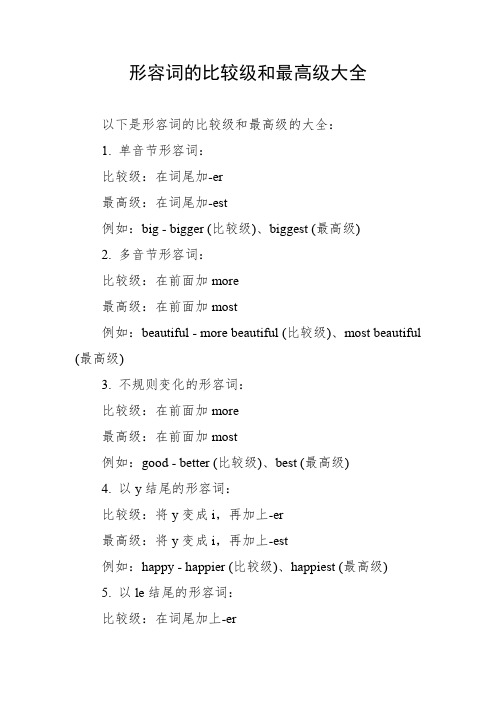
形容词的比较级和最高级大全以下是形容词的比较级和最高级的大全:1. 单音节形容词:比较级:在词尾加-er最高级:在词尾加-est例如:big - bigger (比较级)、biggest (最高级)2. 多音节形容词:比较级:在前面加more最高级:在前面加most例如:beautiful - more beautiful (比较级)、most beautiful (最高级)3. 不规则变化的形容词:比较级:在前面加more最高级:在前面加most例如:good - better (比较级)、best (最高级)4. 以y结尾的形容词:比较级:将y变成i,再加上-er最高级:将y变成i,再加上-est例如:happy - happier (比较级)、happiest (最高级)5. 以le结尾的形容词:比较级:在词尾加上-er最高级:在词尾加上-est例如:possible - more possible (比较级)、most possible (最高级)6. 少数不规则变化的形容词:比较级:在前面加more最高级:在前面加most例如:famous - more famous (比较级)、most famous (最高级)7. 特殊的比较级和最高级:例如:well - better (比较级)、best (最高级)8. 副词的比较级和最高级:比较级:在后面加-er最高级:在后面加-est例如:slowly - more slowly (比较级)、most slowly (最高级)以上是常见的形容词的比较级和最高级,但是也有一些不规则变化的形容词需要记忆。
同时,需要注意的是,有些形容词没有比较级和最高级,如unique。
形容词的比较级与最高级详细讲解
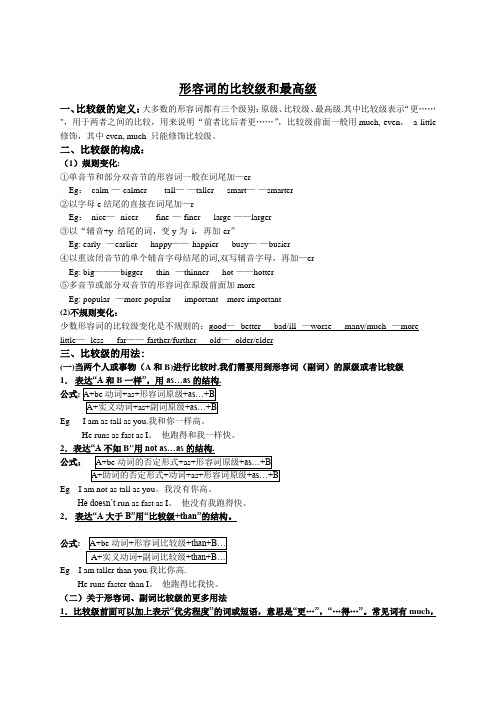
形容词的比较级和最高级一、比较级的定义:大多数的形容词都有三个级别:原级、比较级、最高级.其中比较级表示“更……",用于两者之间的比较,用来说明“前者比后者更……”,比较级前面一般用much, even,a little 修饰,其中even, much 只能修饰比较级。
二、比较级的构成:(1)规则变化:①单音节和部分双音节的形容词一般在词尾加—erEg:calm-—-calmer tall—-—taller smart—-—smarter②以字母e结尾的直接在词尾加—rEg:nice—--nicer fine-—-finer large-——larger③以“辅音+y 结尾的词,变y为i,再加-er”Eg: early--—earlier happy——-happier busy—-—busier④以重读闭音节的单个辅音字母结尾的词,双写辅音字母,再加—erEg: big———bigger thin--—thinner hot-——hotter⑤多音节或部分双音节的形容词在原级前面加moreEg: popular--—more popular important---more important(2)不规则变化:少数形容词的比较级变化是不规则的:good—--better bad/ill--—worse many/much--—more little—--less far——-farther/further old—--older/elder三、比较级的用法:(一)当两个人或事物(A和B)进行比较时,我们需要用到形容词(副词)的原级或者比较级1.表达“A和B一样”,用as…as的结构.公式Eg I am as tall as you.我和你一样高。
He runs as fast as I。
他跑得和我一样快。
Eg I am not as tall as you。
我没有你高。
He doesn’t run as fast as I。
什么是形容词的比较级和最高级
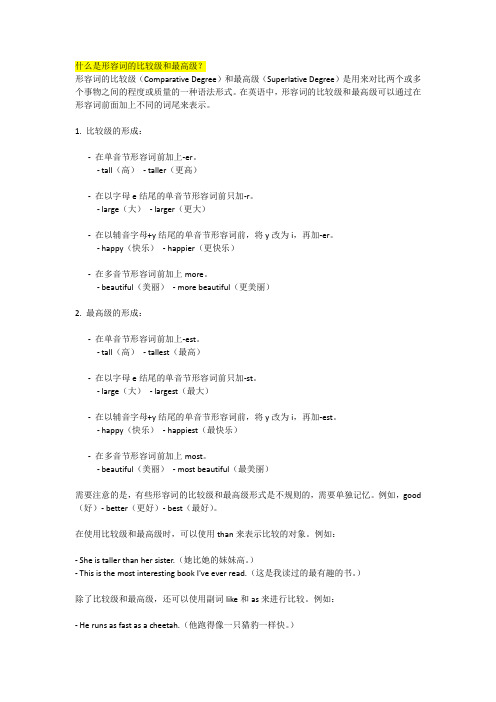
什么是形容词的比较级和最高级?形容词的比较级(Comparative Degree)和最高级(Superlative Degree)是用来对比两个或多个事物之间的程度或质量的一种语法形式。
在英语中,形容词的比较级和最高级可以通过在形容词前面加上不同的词尾来表示。
1. 比较级的形成:-在单音节形容词前加上-er。
- tall(高)- taller(更高)-在以字母e结尾的单音节形容词前只加-r。
- large(大)- larger(更大)-在以辅音字母+y结尾的单音节形容词前,将y改为i,再加-er。
- happy(快乐)- happier(更快乐)-在多音节形容词前加上more。
- beautiful(美丽)- more beautiful(更美丽)2. 最高级的形成:-在单音节形容词前加上-est。
- tall(高)- tallest(最高)-在以字母e结尾的单音节形容词前只加-st。
- large(大)- largest(最大)-在以辅音字母+y结尾的单音节形容词前,将y改为i,再加-est。
- happy(快乐)- happiest(最快乐)-在多音节形容词前加上most。
- beautiful(美丽)- most beautiful(最美丽)需要注意的是,有些形容词的比较级和最高级形式是不规则的,需要单独记忆。
例如,good (好)- better(更好)- best(最好)。
在使用比较级和最高级时,可以使用than来表示比较的对象。
例如:- She is taller than her sister.(她比她的妹妹高。
)- This is the most interesting book I've ever read.(这是我读过的最有趣的书。
)除了比较级和最高级,还可以使用副词like和as来进行比较。
例如:- He runs as fast as a cheetah.(他跑得像一只猎豹一样快。
(完整版)英语形容词比较级

英语形容词比较级英语形容词比较级(一)一般句式的构成:A + is / are+ 形容词比较级+ than + BA 是主格B 是宾格如:She is taller than me.主格形容词比较级宾格(二)英语形容词比较级的构成英语形容词比较等级有三个:原级,比较级和最高级。
形容词比较等级形式变化有规则的和不规则的两种。
规则变化1)单音节词末尾加-er(比较级),-est(最高级)【例】原级比较级最高级great greater greatestsmall smaller smallestclean cleaner cleanest2)单音节如以e结尾,只加-r(比较级),-st(最高级)【例】fine finer finestnice nicer nicestwide wider widest3)闭音节单音节词如末尾只有一个辅音字母,须先双写这个辅音字母,再加-er(比较级),-est(最高级)【例】big bigger biggesthot hotter hottestred redder reddest 4)少数以-y,-er,ow,-ble结尾的双音节词,末尾加-er(比较级),-est(最高级)。
以-y结尾的词,如-y前是辅音字母,则变y为-i,再加-er和-est。
以-e结尾的词只加-r和-st。
【例】clever cleverer cleverestnarrow narrower narrowestable abler ablesteasy easier easiest5)其它双音节和多音节词皆在前面加单词more和most。
【例】careful more careful most carefuldifficult more difficult most difficultdelicious more delicious most delicious不规则变化原级比较级最高级good/well better bestbad worse worstmany/much more mostlittle less leastfar farther/further farthest/furthest注:有些形容词一般没有比较等级。
(完整版)比较级和最高级

(完整版)比较级和最高级一、形容词的比较级和最高级变化规则;1、规则变化:(1) 单音节词和少数双音节词一般在词尾加er或est:如: small ---smaller --- the smallest(2) 以不发音的e字母结尾的加r,或st:如: late --- later --- the latest(3) 以辅音字母加y结尾的变y为I加er或est:如: easy --- easier --- the easiest(4)以一个辅音字母结尾的重读闭音节词双写最后一个辅音字母再加er或est:如: big --- bigger --- the biggest以er,ow结尾的双音节词加er 或est如: slow --- slower --- the slowest(5) 多音节词前加more或most, 副词最高级前省略the.如: important --- more important --- the most important2.不规则变化good / well --- better --- the best 好bad / badly / ill --- worse --- the worst 坏many / much --- more --- the most 多little --- less --- the least 少old --- older / elder --- the oldest / the oldest 老, 旧far --- farther / further --- the farthest / the furthest 远常见形容词比较级、最高级变化一览表1.在形容词词尾加上“er”“est”构成比较级、最高级:bright(明亮的)—brighter—brightest broad(广阔的)—broader—broadest cheap(便宜的)—cheaper—cheapest clean (干净的)—cleaner—cleanestclever(聪明的)—cleverer—cleverest cold(寒冷的)—colder—coldest cool(凉的)—cooler—coolest dark(黑暗的)—darker—darkest deep(深的)—deeper—deepest fast(迅速的)—faster—fastestfew(少的)—fewer—fewest great(伟大的)—greater—greatest hard(困难的,硬的)—harder—hardest high(高的)—higher—highest kind(善良的)—kinder—kindest light(轻的)—lighter—lightest long(长的)—longer—longest loud(响亮的)—louder—loudestlow(低的)—lower—lowest near(近的)—nearer—nearest new(新的)—newer—newest poor(穷的)—poorer—poorestquick(快的)—quicker—quickest quiet(安静的)—quieter—quietestrich(富裕的)—richer—richest short(短的)—shorter—shortestslow(慢的)—slower—slowest small(小的)—smaller—smallest smart(聪明的)—smarter—smartest soft(柔软的)—softer—softest strong(强壮的)—stronger—strongest sweet (甜的)—sweeter—sweetest tall(高的)-taller-tallest thick(厚的)—thicker—thickest warm(温暖的)—warmer—warmest weak(弱的)—weaker—weakest young(年轻的)—younger—youngest2.双写最后一个字母,再加上“er”“est”构成比较级、最高级:big(大的)—bigger—biggest fat(胖的)—fatter—fattesthot(热的)—hotter—hottest red(红的)—redder—reddestsad(伤心的)—sadder—saddest thin(瘦的)—thinner—thinnestwet(湿的)—wetter—wettest mad(疯的)—madder—maddest3.以不发音的字母e结尾的形容词,加上“r”“st”构成比较级、最高级:able(能干的)—abler—ablest brave(勇敢的)—braver—bravest close(接近的)—closer—closest fine(好的,完美的)—finer—finest large(巨大的)—larger—largest late(迟的)—later—latestnice(好的)—nicer—nicest ripe(成熟的)—riper—ripestrude(粗鲁的)—ruder—rudest safe(安全的)—safer—safest strange(奇怪的)—stranger—strangest wide(宽广的)—wider—widest wise(睿智的,聪明的)—wiser—wisest white(白的)—whiter—whitest4.以字母y结尾的形容词,把y改为i,再加上“er”“est”构成比较级、最高级:busy(忙碌的)—busier—busiest dirty(脏的)—dirtier—dirtiest dry(干燥的)—drier—driest early(早的)—earlier—earliest easy(容易的)—easier—easiest friendly(友好的)—friendlier—friendliest funny(好玩的)—funnier—funniest happy(开心的)—happier—happiest healthy(健康的)—healthier—healthiest heavy(重的)—heavier—heaviest hungry(饿的)—hungrier—hungriest lazy(懒惰的)—lazier—laziestlucky(幸运的)—luckier—luckiest naughty(调皮的)—naughtier—naughtiest noisy(嘈杂的)—noisier—noisiest pretty (美丽的)—prettier—prettiest silly(傻的)—sillier—silliest spicy(辣的)—spicier—spiciestthirsty(渴的)—thirstier—thirstiest ugly(丑的)—uglier—ugliest4.双音节、多音节形容词,在单词前面加上“more”“most”构成比较级、最高级:afraid(害怕的)—more afraid—most afraidbeautiful(美丽的)—more beautiful—most beautifulcareful(仔细的)—more careful—most carefulcheerful(开心的)—more cheerful—most cheerfulcrowded(拥挤的)—more crowded—most crowdeddangerous(危险的)—more dangerous—most dangerous delicious(美味的)—more delicious—most deliciousdifficult(困难的)—more difficult—most difficultexciting(令人兴奋的)—more exciting—most excitingexpensive(昂贵的)—more expensive—most expensivefamous(著名的)—more famous—most famousfrightened(受惊的)—more frightened—most frightened frightening(令人害怕的)—more frightening—most frighteninghard-working(勤奋的)—more hard-working—most hard-workinghelpful(有帮助的)—more helpful—most helpfulhonest(诚实的)—more honest—most honestimportant(重要的)—more important—most importantinteresting(有趣的)—more interesting—most interesting polite(有礼貌的)—more polite—most politeterrible(可怕的)—more terrible—most terribletired(累的)—more tired—most tired5.不规则变化的形容词:bad(坏的)—worse—worst good(好的)—better—bestfar(远的)—farther—farthest (far—further—furthest)ill(病的)—worse—worst little(少的)—less—leastmany(多的)—more—most much(多的)—more—most old(年老的)—older—oldest ( old—elder—eldest)well(好的,身体好的)—better—best一. 写出下列形容词或副词的比较级和最高级.bad ________________ ______________________________clean ________________ ______________________________ famous ______________ _______________________dirty _________________ ______________________________big __________________ _____________________________small _________________ ______________________________heavy _____________ ______________________little __________________ ______________________________hard __________________ ______________________________ happy _________________ ______________________________far ___________________ ______________________________ expensive _____________________ ________________________________ well _________________ ______________________________easy __________________ ______________________________ wide ___________________ _______________________________ young _________________ ________________________________ rude ___________________ ________________________________ cheap ___________________ _______________________________ ugly __________________ _________________________________ busy ___________________ ________________________________ old ____________________ _________________________________ noisy __________________ _________________________________ interesting _____________________ _______________________________ hot ____________________ _________________________________ cold ___________________ _________________________________ many __________________ ________________________________ bright __________________ _______________________________ boring __________________ _______________________________ difficult _______________________ ________________________________ beautiful _______________________ _____________________________thin _____________________ _______________________________ good ____________________ _______________________________ strong____________________ ______________________________ high _________________ _______________________warm ________________ _______________________late __________________ _______________________weak _________________ ______________________tall ___________________ ______________________short __________________ ______________________loud ___________________ ______________________lazy ___________________ ______________________quick __________________ ______________________angry __________________ ______________________clever __________________ ______________________smart __________________ ______________________low ____________________ __________________二、选择填空1. Which does Jimmy like _____ , Chinese or Art?A. wellB. bestC. betterD. much2. The Changjiang River is one of _____ in the world.A. the longest riverB. longest riversC. the longest riversD. longer rivers3. _____ of the two women is Mrs Brown.A. The beautifulB. The more beautifulC. More beautifulD. The most beautiful4. My mooncake is nicer _____ his.A. likeB. withC. forD. than5. You are fatter than _____ .A. heB. hisC. himD. he is tall6. He jumps _____ of the three.A. farB. furtherC. farthestD. furthest7. My hair is longer than _____ .A. my sisterB. KateC. my brother’sD. Lucys’8. There are _____ paper here .Please bring some.A. littleB. lessC. fewerD. a little9. The pen is _____ than that one.A. more cheapB. cheapC. much cheaperD. quite cheaper10.Tom speaks Chinese _____ better than Jimmy.A. moreB. veryC. a lot ofD. much11.There are _____ girls in Class Two than in Class Four.A. moreB. nicestC. mostD. best12.It’s too _____ for you to do that.A. easyB. more dangerousC. harderD. the easiest13.Who has _____ apples now, Jim, Lily or Lucy?A. muchB. biggestC. betterD. the most14.You have more rulers than me. But _____ are nicer than _____ .A. mine, yoursB. mine, yourC. my, yoursD. my, your15.Tingting is _____ than Meimei, but Meimei is _____ than Tingting.A. all, strongerB. taller, strongestC. tallest, strongD. taller, stronger16.Mother is _____ in my family.A. busyB. busierC. the busiestD. more busy17.There are _____ in the park on Sunday.A. more childrenB. a lot of peopleC. much men and womenD. many peoples18.-This blue sweater is too big for me .-Will you please show me a _____ one?A. smallB. smallerC. the smallestD. smallest19.No one is _____ Mary in the class.A. so tallest asB. as taller asC. so high asD. so tall as20. This bike is _____ than that one.A. twenty yuan dearB. twenty yuan dearerC. dear twenty yuanD. dearer twenty yuan[参考答案] CCDDA CDBCD AADAD CBBDB三、用所给词的适当形式填空1.Your classroom is _____ (wide) and _____ (bright) than ours.2.There are _____ (few) hours of sunlight a day in winter than in summer.3.Which do you like _____ (well) , maths or chemistry?4.This is the _____ (good) film I have ever seen.5.Africa is the second _____ (large) continent.6.What he said made his mother much _____ (angry) .7.I’m not as _____ (careful) as he.8.We’ve got as _____ (many) books as we need.9.Pratice as _____ (much) as you can.10.They have done _____ (much) work with _____ (little) money.11.You’re the _____ (kind) person I’ve ever met.12.He is _____ (young) than his two sisters.13.The _____ (old) I get, the _____ (strong) I seem to feel.14.The weather is getting _____ (warm) and _____ (warm) .15.Summer is _____ (hot) season of the year.[参考答案] 1. wider, brighter 2. fewer 3. better 4. best 5. largest 6. angry 7. careful 8. many 9. much 10. more, less 11. kindest 12. younger 13. older, stronger, 14. warmer, warmer 15. the hottest。
形容词的比较级和最高级知识讲解及练习整理

形容词的比较级和最高级知识讲解及练习整理在英语学习中,形容词的比较级和最高级是非常重要的语法知识点。
它们用于描述事物之间的程度差异,让我们的表达更加准确和丰富。
接下来,让我们一起深入了解一下形容词的比较级和最高级的相关知识,并通过一些练习来巩固所学。
一、形容词比较级和最高级的构成规则1、一般情况下,直接在形容词词尾加 er 构成比较级,加 est 构成最高级。
比如:small smaller smallesttall taller tallest2、以不发音的字母e 结尾的形容词,直接在词尾加r 构成比较级,加 st 构成最高级。
例如:nice nicer nicestwide wider widest3、重读闭音节结尾且末尾只有一个辅音字母的形容词,要先双写这个辅音字母,然后再加 er 构成比较级,加 est 构成最高级。
比如:big bigger biggesthot hotter hottest4、以“辅音字母+y”结尾的形容词,要先把 y 变为 i,再加 er 构成比较级,加 est 构成最高级。
例如:happy happier happiestheavy heavier heaviest5、部分双音节和多音节形容词,在词前加 more 构成比较级,加most 构成最高级。
比如:beautiful more beautiful most beautifulimportant more important most important二、形容词比较级和最高级的用法1、比较级的用法表示两者之间的比较,常用“than”连接。
例如:He is taller than me(他比我高。
)可以用“much / a lot / far +比较级”表示“……得多”,“a little /a bit +比较级”表示“……一点儿”。
比如:This book is much more interesting than that one(这本书比那本有趣得多。
常见形容词的比较级和最高级有哪些
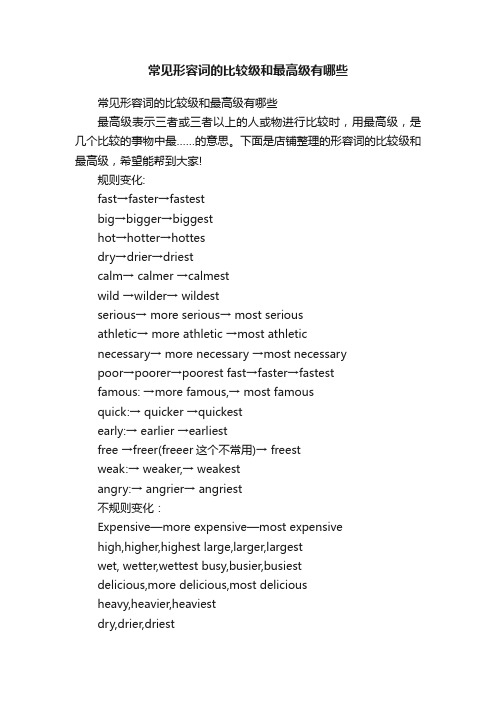
常见形容词的比较级和最高级有哪些常见形容词的比较级和最高级有哪些最高级表示三者或三者以上的人或物进行比较时,用最高级,是几个比较的事物中最……的意思。
下面是店铺整理的形容词的比较级和最高级,希望能帮到大家!规则变化:fast→faster→fastestbig→bigger→biggesthot→hotter→hottesdry→drier→driestcalm→ calmer →calmestwild →wilder→ wildestserious→ more serious→ most seriousathletic→ more athletic →most athleticnecessary→ more necessary →most necessarypoor→poorer→poorest fast→faster→fastestfamous: →more famous,→ most famousquick:→ quicker →qu ickestearly:→ earlier →earliestfree →freer(freeer这个不常用)→ freestweak:→ weaker,→ weakestangry:→ angrier→ angriest不规则变化:Expensive—more expensive—most expensivehigh,higher,highest large,larger,largestwet, wetter,wettest busy,busier,busiestdelicious,more delicious,most deliciousheavy,heavier,heaviestdry,drier,driesteasy easier easiestlazy lazier laziestpretty prettier prettiestnaughty naughtier naughtiestmealy mealier mealiestearly earlier earliestthirsty thirstier thirstiestfar→farther→farthestfar→further→furthestDull—duller--dullestLoud-louder--loudestBoring—more boring—most boringCreative—more creative—most creativeWarm---warmer--warmestgood / well→better→bestbad / ill→worse→worstmany / much→more→mostlittle→less→leastlate→later→ / latestlate→latter→last【拓展】关于形容词和副词的比较级一、含义1. 大多数形容词和副词有三个等级:原级、比较级、最高级: good – better - best2. 比较级:表示两者(人或物)之间的比较。
形容词的比较级与最高级的例词

形容词的比较级与最高级的例词形容词是用来描述人、事物、情感和行为特征的词语,而形容词的比较级和最高级则是用来对不同事物或人的特征进行比较和排序。
在英语中,形容词的比较级和最高级有一定的构造规则和用法。
下面将以几个常见的形容词为例,详细介绍形容词的比较级和最高级。
1. Tall(高):- 比较级:taller(更高的)- 最高级:tallest(最高的)举例:- My brother is taller than me.(我的哥哥比我高)- John is the tallest student in our class.(约翰是我们班最高的学生)2. Bright(明亮的):- 比较级:brighter(更明亮的)- 最高级:brightest(最明亮的)举例:- The sun is brighter than the moon.(太阳比月亮更明亮)- This room has the brightest light.(这个房间有最亮的光线)3. Fast(快的):- 比较级:faster(更快的)- 最高级:fastest(最快的)举例:- The cheetah is faster than any other animal.(猎豹是比其他动物都更快的)- Usain Bolt is the fastest sprinter in the world.(尤塞恩·博尔特是世界上最快的短跑运动员)4. Delicious(美味的):- 比较级:more delicious(更美味的)- 最高级:most delicious(最美味的)举例:- The cake is more delicious than the cookies.(蛋糕比饼干更美味)- This restaurant serves the most delicious food in town.(这家餐厅提供镇上最美味的食物)5. Interesting(有趣的):- 比较级:more interesting(更有趣的)- 最高级:most interesting(最有趣的)举例:- The book is more interesting than the movie.(这本书比电影更有趣)- The history museum was the most interesting place we visited.(历史博物馆是我们参观的最有趣的地方)通过上述例子,我们可以看到形容词的比较级和最高级的构造方式。
(完整word版)英语比较级和最高级

形容词比较级和最高级的形式一、形容词比较级和最高级的构成形容词的比较级和最高级变化形式规则如下构成法原级比较级最高级①一般单音节词末尾加和②单音节词如果以结尾,只加和③闭音节单音节词如末尾只有一个辅音字母,须先双写这个辅音字母,再加和bighot sadderbiggerhotter saddestbiggesthottest④少数以或结尾的双音节词,末尾加和以结尾的词,如前是辅音字母,把y变成i,再加和,以结尾的词仍只加和CleverNarrowNoble angrierCleverernarrowernobler angriestcleverestnarrowestnoblest⑤其他双音节和多音节词都在前面加单词more和most different moredifferent mostdifferent1) The most high 〔A〕mountain in 〔B〕the world is Mount Everest,which is situated 〔C〕in Nepal and is〔D〕 .2) This house is spaciouser 〔A〕than that 〔B〕white 〔C〕one I bought in Rapid City,South Dakota 〔D〕last year.3) Research in the social 〔A〕sciences often proves difficulter 〔B〕than similar 〔C〕work in the physical 〔D〕sciences.二、形容词比较级或最高级的特殊形式:1. 三个或三个以上音节的形容词只能加more和most只能说more beautiful而不能说beautifuller; 只能说the most beautiful而不能说beautifullest。
但是,以形容前缀结尾的三音节形容词不适合上述情况,如unhappy,untidy,我们可以说:unhappier→unhappiest, untidier→untidiest2. 由分词和分词演变过来的形容词(包括不规则动词如know→known)只能加more或most来表示它们的比较级和最高级more(most) striking, more(most) interesting, more(most) wounded, more(most)worn等。
(完整版)常见形容词比较级最高级变化一览表
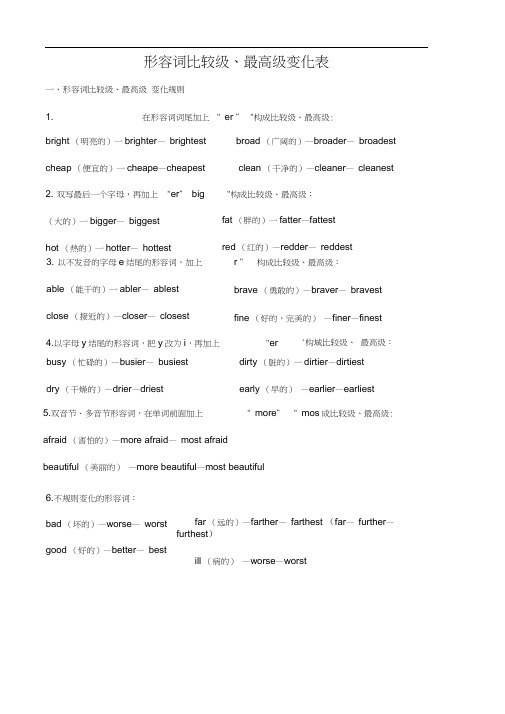
形容词比较级、最高级变化表一、形容词比较级、最高级 变化规则1. 在形容词词尾加上 “ er ” “构成比较级、最高级:bright (明亮的)一brighter — brightestcheap (便宜的)一cheape —cheapest2. 双写最后一个字母,再加上 “er ” big(大的)一bigger — biggest hot (热的)一hotter — hottest broad (广阔的)—broader — broadest clean (干净的)—cleaner — cleanest “构成比较级、最高级: fat (胖的)一fatter —fattestred (红的)—redder — reddest3. 以不发音的字母e 结尾的形容词,加上 able (能干的)一abler — ablest close (接近的)—closer — closest r ” 构成比较级、最高级:brave (勇敢的)—braver — bravestfine (好的,完美的) —finer —finestbusy (忙碌的)—busier — busiestdry (干燥的)—drier —driestdirty (脏的)一dirtier —dirtiest early (早的) —earlier —earliest5.双音节、多音节形容词,在单词前面加上“ more ” “ mos 成比较级、最高级: afraid (害怕的)—more afraid — most afraidbeautiful (美丽的) —more beautiful —most beautifulfar (远的)—farther — farthest (far — further —furthest )ill (病的) —worse —worst 4.以字母y 结尾的形容词,把y 改为i ,再加上“er '构城比较级、 最高级: 6.不规则变化的形容词:bad (坏的)—worse — worstgood (好的)—better — best二、形容词比较级和最高级句型(特殊)比较级句型:1. 在形容词比较级前还可以用much, eve n, still, a little, ......... 来修饰,表示“...... 的多” 甚至 .... ” 更...... ”“.. 一些”Our city is much more beautiful than yours.我们的城市比你们的漂亮得多。
(完整版)英语比较级和最高级
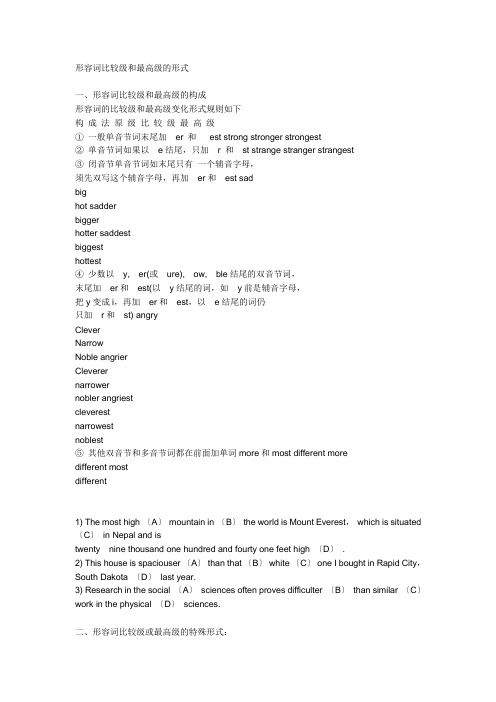
形容词比较级和最高级的形式一、形容词比较级和最高级的构成形容词的比较级和最高级变化形式规则如下构成法原级比较级最高级①一般单音节词末尾加er 和est strong stronger strongest②单音节词如果以e结尾,只加r 和st strange stranger strangest③闭音节单音节词如末尾只有一个辅音字母,须先双写这个辅音字母,再加er和est sadbighot sadderbiggerhotter saddestbiggesthottest④少数以y,er(或ure),ow,ble结尾的双音节词,末尾加er和est(以y结尾的词,如y前是辅音字母,把y变成i,再加er和est,以e结尾的词仍只加r和st) angryCleverNarrowNoble angrierCleverernarrowernobler angriestcleverestnarrowestnoblest⑤其他双音节和多音节词都在前面加单词more和most different moredifferent mostdifferent1) The most high 〔A〕mountain in 〔B〕the world is Mount Everest,which is situated 〔C〕in Nepal and istwenty nine thousand one hundred and fourty one feet high 〔D〕 .2) This house is spaciouser 〔A〕than that 〔B〕white 〔C〕one I bought in Rapid City,South Dakota 〔D〕last year.3) Research in the social 〔A〕sciences often proves difficulter 〔B〕than similar 〔C〕work in the physical 〔D〕sciences.二、形容词比较级或最高级的特殊形式:1. 三个或三个以上音节的形容词只能加more和most只能说more beautiful而不能说beautifuller; 只能说the most beautiful而不能说beautifullest。
- 1、下载文档前请自行甄别文档内容的完整性,平台不提供额外的编辑、内容补充、找答案等附加服务。
- 2、"仅部分预览"的文档,不可在线预览部分如存在完整性等问题,可反馈申请退款(可完整预览的文档不适用该条件!)。
- 3、如文档侵犯您的权益,请联系客服反馈,我们会尽快为您处理(人工客服工作时间:9:00-18:30)。
1.规则变化
单音节词和少数双音节词,加词尾-er, -est来构成较级和最高级。
其Array他双
音节
词和
多音
节
词,
在前
面加
mor
e,
most来构成比较级和最高级。
2.不规则变化
形容词比较级最高级练习题
一、写出下列形容词的比较级和最高级
1. old ______________
2. busy __________________
3. thin ________________
4. many __________________
5. slow ________ _____
6. delicious _________ ______
二、用适当形式填空:
1. Bob is________( young ) than Fred but__________(tall) than Fred.
2. He is ______ (bad) at learning maths. He is much _______ (bad) at Chinese and he is
the_________ (bad) at English.
3. Annie says Sally is the ________ (kind) person in the world.
4 A dictionary is much _________ (expensive)than a story-book.
5. An orange ia a little ______ (big) than an apple, but much ________ (small) than a
watermelon.
6. Playing computer games is______ _____ _____ of all the activities.(interesting).
7. The Nile(尼羅河) is ______ ________river in the world. (long)
8. Good health is _______ _______ ________thing life. (important)
9. Taking a taxi is ______ _______ way to get to the airport. (easy)
10. She is_______ than all the other students. (young)
11. Where is the ________bus-stop? (near)
12. Tom drives much ________ ________than John. (careful)
13. The white flower is ________(beautiful). The yellow flower is ______ _______ (beautiful)than the white flower. The red flower is the _____ ______ of the three.
三、选择题
1. She is ________ than ________ .
A. busier / us
B. busier / we
C. more busy / us
D. more busy / we
2.China is ________ country in the world.
A. the third largest
B. the largest third
C. the third large
D. a third largest
3. -Which is ____ season in Beijing?-I think it's autumn.
A.good
B.better
C.best
D.the best
4.- Which is__________ , the sun, the moon or the earth?-- Of course, the moon is.
A.small
B.smaller
C.smallest
D.the smallest
5.The air in Beijing is getting much _____ now than a few years ago.
A. clean
B. cleaner
C. cleanest
D. the cleanest
6. Mobile phones are very popular now and they are _____ than before.
A. cheap
B. cheaper
C. cheapest
D. the cheapest
7 Which is _____ , a bicycle or a computer?
A.expensive
B.more expensive
C.the most expensive
8. The Yellow River is one of ______rivers in China A long B longer C the longest
9.She is the second _______student in our class. A. tall B. taller C. tallest
感谢下载!
欢迎您的下载,资料仅供参考。
